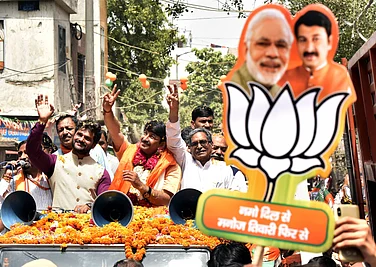THE expression on the jawan’s face was enough to make me jump back in fear. Clad in daunting fatigues, the stonefaced young man was getting increasingly hysterical. How could anybody challenge his authority by entering the desert area declared ‘out of bounds’ where not even a parinda was allowed? He approached me menacingly and shouted angrily: "Who are you and why have you come here? Ekdam vapis jaao."
By then three more armed jawans had come out of the makeshift hut constructed with dried shrubs, roots and canvas. Surrounded by frowning soldiers, my photographer, two village lads from the nearby hamlet of Khetolai and I found ourselves cowering in the scorching sun amid hot winds sweeping across the vast expanses of barren land deep in the Desert of Thar in western Rajasthan.
Welcome to India’s nuclear test site near Pok-hran in the border district of Jaisalmer where India stunned the world by carrying out five nuclear explosions. For a moment I thought I was in the middle of a war zone. For a moment I cursed myself for taking the risk of sneaking beyond Khetolai village and getting as close to the actual explosion site as possible. After all, other mediapersons had also come to cover the explosion, but nobody tried to venture through the army ring. The words of caution from the villagers were ringing in my ears: "Don’t you dare venture into the desert. Nobody is allowed inside the range. They could arrest you,they could beat you up and they could even kill you."
For a moment I thought the soldier was about to hit me in a fit of anger. But before he could do that, I flashed my accreditation card issued by the Press Information Bureau, hoping that it would at least satisfy the jawan that I was not a jasoos. Much later I realised that in an effort to sound confident and normal, I also shouted back with the same pompousness characteristic of army personnel: "We are from Delhi...from the press." While one of the soldiers started struggling with the field phone to inform the ‘higher-ups’ of our presence, another ‘ordered’ the four of us into the hut. I knew we were in the unpronounced custody of the Indian army. I could actually feel what it was like to be a POW. A chill went down my spine.
However, for the people of Khetolai it was not a new experience. Many of the villagers who strayed into the prohibited zone chasing their cattle had to face the wrath of the army. They were blindfolded, handcuffed and subjected to rigorous questioning. In December, Bhikha Ram, 16, was caught inside the range and was blindfolded for 12 hours. He recounts: "My cattle had strayed into the range area. I managed to cut the fence wire and went inside the area to get my herd back. But the army people caught me and I was kept blindfolded for 12 hours. They kept saying, you are a spy." The villagers say the test site is surrounded by three layers of barbed-wire fences.
Similarly, Asha Ram and Ladhu Ram of the same village were caught inside the fence and were blindfolded. "The first thing they do is to blindfold the person caught inside the test range, so that he cannot take in the details of the area," says 35-year-old Shaitan Ram. But then, never in their wildest dreams did the villagers imagine that under the eyes of snoopy satellites the government was secretly drawing up a plan to catapult India to nuclear status.
Though the activity around the area had been rather unusual recently, nobody in Khetolai had an inkling of the actual plan, until helicopters began hovering over the village. In fact, flying of helicopters over the test range was stopped in 1995. But the villagers got suspicious when some helicopters started hovering around the area early this month. Says Sajan Ram, an ex-serviceman in Khetolai: "When truck-loads of concrete, stone, onion and potatoes were taken to the site, sensible people could understand that something big was happening." Villagers insist that hundreds of tonnes of onions and potatoes were dumped at the site to ‘lessen the effect’ of the explosions.
The activity brought alive the memories of the ’74 explosion. Even though no official survey was conducted in the area on the after-effects of the ’74 test, the villagers recall that during the following rainy season the entire village suffered ailments like khu-jli (itching). Even camels and cows suffered from the disease. Asha Ram claims that before the explosion serious diseases like cancer, polio or heart ailments were unheard of.
Since then, he says, at least six people have died of cancer and five are suffering from serious heart ailments, while seven children born after the explosion have polio.Munni Lal (15) and three-year old Dev Kis-han are mentally retarded. All these may not be the direct result of the nuclear explosion but the villagers fear that this rainy season may bring another round of sufferings. Not that Khetolai is only cribbing. "Pakistan has got the reply to Ghauri," beams a well-informed young lad.
THE veil of secrecy was so thick that hours before the explosion on May 11, an army brigadier came to the village and asked Mangi Lal a specific question: "Does any Muslim reside in the village?" And two hours before the explosion all telephones and electricity lines of the village were disconnected. The army jawans told the villagers to stay out of their houses between 3 pm and 5 pm.
Equipped with sophisticated weaponry and a field phone to keep in touch with the Command, the jawans are on perpetual alert. Besides a 30-ft-high tower to keep a watch on the surroundings, they have erected a tin-shade to house their belongings and communication system. But it becomes rather impossible to venture into the structure during the summers when the earth burns like a furnace. And so, the soldiers spend the day in a makeshift shade made with dried shrubs and roots and thick canvas. To beat the heat they keep sprinkling water on the roots.
Soon enough one of the soldiers had established contact with his officers. He handed the phone to me and a firm voice from the other side stated: "Please go back and don’t compel my chaps to allow you to go beyond because we are conducting some mining exercise which might cause you harm." There was no scope for a second thought. The jawans very politely offered us water and we beat a hasty retreat to the waiting cab. The villagers told us later that they were threatened and abused by the jawans for taking us to the range.
It was 3.30 pm on May 13, 1998, and the illegal channel to reach the explosion site had been exhausted. So, I decided to go through the "proper channel". It was difficult to give up. Half-an-hour later we were knocking on the gate of the main army office on the Jodhpur-Jaisalmer highway.
"Hold your horses for at least 48 hours. We are still in the middle of the operation. We have carried out another series of two explosions just a couple of hours ago...the Instrument is still on," informed a gleaming colonel straight out of a beer party. As I turned back to get into my car, I heard the strict voice of the Colonel behind me: "And listen! No quotes." I dare not.


























